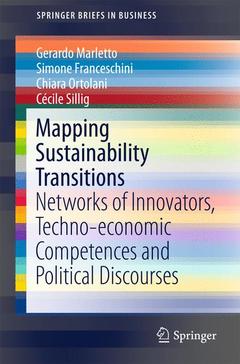Description
Mapping Sustainability Transitions, 1st ed. 2016
Networks of Innovators, Techno-economic Competences and Political Discourses
SpringerBriefs in Business Series
Language: English
Subjects for Mapping Sustainability Transitions:
Support: Print on demand
Description
/li>Contents
/li>Biography
/li>Comment
/li>
This book was written for anyone wishing to understand how sustainable scenarios emerge from current innovations. It complements current sustainability transition research by providing a ?socio-technical map,? an analytical and operational tool that can be used to explain the current positioning of innovators and their networks; to form alternative transition pathways and scenarios; and to design policies for a sustainability transition. Drawing on multiple disciplinary approaches to the study of ?green? innovations and focusing specifically on operational directives, it examines and assesses multiple transition pathways (and supporting networks). Lastly, it presents three sectorial case studies (urban mobility, agri-food, and lighting) to demonstrate how the ?socio-technical map? can be concretely put into practice.




